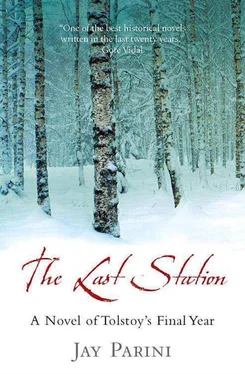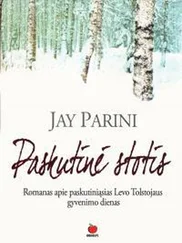‘It’s so peculiar,’ Papa would say. ‘Imagine. There was a time when I was fascinated by hunting and killing.’ He would always say the same thing, and I would always say nothing.
This past January, Tanya’s stepson, Dorik Sukhotin, was visiting and came down with measles. He was bedded down next to the Remington room in a cot, a somewhat halfhearted attempt to quarantine him from the rest of the family. We were all frantic and did everything to make him feel better. Doctors came and went, pontificating and prattling, while I brought the child sweet things and cool drinks for his fever. Each evening I would read to him from a children’s encyclopedia. Dorik recovered, thank God, but before long I found myself breaking out in a rash on my stomach. It spread to my back and arms. Soon I began to cough blood.
Papa grew anxious for me, remembering how my sister Masha had swiftly been taken from us by an illness. Every night he brought me water in a large tin cup, his wrinkled hand trembling. The water would run out of my mouth and down my chin, but I would cover his dear, sweet hand with kisses. And he would sob, taking hold of my hand, pressing it to his beard.
Varvara Mikhailovna almost never left my side. Her soft, full face and chestnut curls were a comfort to me. When Papa left the room, she would climb onto the bed and hold me, rubbing her cheek against mine, so close, without any fear that she might catch my illness.
We had become dear friends. Though we’d met several years before in Moscow, we didn’t see much of each other. Our correspondence grew longer and more intimate, and I finally persuaded Mama to let her come and live with us. Secretarial help is always needed at Yasnaya Polyana, and Varvara can type and take dictation.
She has been here for several months now, and we have grown to love each other in the pure love of Christ. We share all fears, all hopes. We touch: hand to hand, chin to chin. We call and respond, alternately, reveling in the flux of real affection.
Now March has come, and the air shimmers with expectation. The midmorning sun on the snow outside is almost too bright to bear, brassy on the windows, filling the house with thick shafts of light. The ice lining the dirt road to our door has begun to melt at the edges.
I’m feeling better, too, though I still cough blood in the morning. The measles have disappeared, but Dr Makovitsky has raised the specter of consumption. This worries Papa – terrifies him, in fact. But Mama does not trust Dr Makovitsky, which is pure spite on her part; she insists on bringing these doctors from Moscow. They claim that I must spend at least two months in the Crimea for my lungs. I spoke of this possibility to Varvara Mikhailovna last night as she daubed my forehead with a moist cloth.
‘If I go,’ I explained to her, ‘Papa will be left alone, and Mama will devour him. He’ll be miserable without me. Who would protect him?’
‘There is Dr Makovitsky.’
‘Mama isn’t afraid of him. She treats him like a little boy. She would have free reign over the house. There’s no telling what damage–’
‘Your father can take care of himself, Sasha. He’s far more in control here than you realize. Your mother is the one who doesn’t stand a chance.’
This was absurd, but I didn’t pursue it, turning on my stomach so that Varvara could massage my neck and shoulders.
‘I’m frightened, Varvara,’ I said.
‘By what?’
‘If I go, I may never see Papa again. He is so frail.’
‘Leo Nikolayevich has been frail for many years. But he’s a tough old bird.’
Varvara muttered something about my silliness as she bent down, putting her chin against the crook of my neck. I could feel her warm breath on my skin, her rhythmical exhalation. We do this almost every night now, savoring these quiet moments together. Occasionally we will read a passage together from the Bible or some piece of Buddhist scripture. Bulgakov, at my request, supplied us with a copy of his list of quotations from the great European thinkers and poets, and we read these aloud. I fall asleep thinking of Leconte de Lisle and Sully Prudhomme, dreaming of a warm, sunlit terrace on the Black Sea, where Varvara and I will sit for hours, reading novels, eating oranges, and drinking tea.
But I hate to leave Papa at a time when he seems terribly in need of my support. He needs to feel that I am here, his shield against Mama.
Papa is old, yes, but he is working well on so many projects. There is ‘The Khodynka,’ a story, and his introduction to The Way of Life . He writes endless letters, too. I don’t know why he bothers. Thank goodness for Bulgakov and Varvara, who help him every day by typing into the wee hours.
Papa came into my bedroom this morning, dressed in white. Like a priest.
‘My sweetheart, I just spoke with your mother, and we have decided that you must leave for the Crimea as soon as possible. You can take Varvara Mikhailovna with you, for company.’
‘Do you want me to go?’
He put his thin arms around my shoulders and said that he would give anything not to lose me, but that I must go to preserve my health. He also said that I must not worry about him, and that, in any case, I’d be gone for only a short time.
‘It will be summer before you even notice,’ he said. ‘Soon we’ll all be swimming in the Voronka – like always.’
He promised a vegetarian hunt as soon as I came back. He winked, and we kissed, but his eyes had filled with tears. I wondered whether in three months Papa would exist for me as anything but a sharp feeling of sadness, a photographic image on my bed table, a row of books, an empty room.
It’s not that I don’t like it here at Yasnaya Polyana. Would I have stayed for nearly half a century if I’d wanted to leave? Yasnaya Polyana was once magnificent – in the days of old Count Volkonsky, Lyovochka’s grandfather. That house would have suited me fine. But Lyovochka gambled it away. One wing had become a schoolhouse for peasant children – an attempt to put Rousseau’s idiotic theories of education into practice. The heart is naturally wicked, as the Scriptures say. The other wing is where I was asked to live. It was barren, with floors of polished oak mixed with dimpled pine and no carpets. The windows had no curtains to subdue the harsh light teeming in from the fields. Except for the odd portrait of an illustrious ancestor, the white walls were devoid of ornament. My husband of only a few days led me into a bedroom that was more like a barracks, without wardrobes or chests of drawers. The miserably hard bed was simply a pad of tightly woven straw, and Lyovochka insisted that we use an old red-leather pillow that had been his grandfather’s. I was expected to sleep in felt slippers to keep my feet warm, or to get a pair of bast shoes of the kind worn by peasant women!
I had been through the most trying week of my life. Lyovochka turned up at the church in the Kremlin an hour late for the wedding ceremony, saying he could not find a clean shirt!
After the service, through which I wept like a ninny, we bade everyone good-bye and set off into the future. We went by coach to a little village outside of Moscow called Birulyevo, where we stayed at an inn. Lyovochka behaved like a rabid dog, but I had expected this, after reading his diaries. It took me years to understand why he gave me those diaries. Lyovochka wanted a reader, not a wife. Someone to devote herself to his language, his vision. And now he wants other readers: Chertkov, Sasha, Bulgakov, Dushan Makovitsky. So I am useless.
I feel as forlorn now as I did then, forty-eight years ago, when we drove through the gates of Yasnaya Polyana on a hot, dusty day in late September. I was swimming in my own perspiration, overdressed for the occasion in a blue silk dress. Aunt Toinette, wizened and skeptical, stood on the front stoop with an icon in her hands. The stony look in her eye contradicted her welcoming words.
Читать дальше












